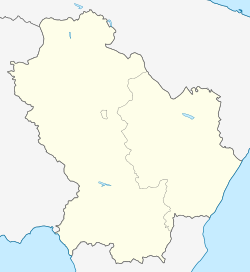Cancellara
You can help expand this article with text translated from the corresponding article in Italian. (January 2022) Click [show] for important translation instructions.
|
Cancellara
Comune di Cancellara | |
|---|---|
| Municipality of Cancellara | |
 View of Cancellara | |
| Coordinates: 40°44′N 15°55′E / 40.733°N 15.917°E | |
| Country | Italy |
| Region | Basilicata |
| Province | Potenza (PZ) |
| Government | |
| • Mayor | Antonio Lo Re |
| Area | |
• Total | 42.12 km2 (16.26 sq mi) |
| Elevation | 680 m (2,230 ft) |
| Population (4-30-2023)[2] | |
• Total | 1,126 |
| • Density | 27/km2 (69/sq mi) |
| Demonym | Cancellaresi |
| Time zone | UTC+1 (CET) |
| • Summer (DST) | UTC+2 (CEST) |
| Postal code | 85010 |
| Dialing code | 0971 |
| ISTAT code | 076018 |
| Patron saint | St. Blaise |
| Saint day | 3 February |
| Website | Official website |
Cancellara (Lucano: Cangeddàre) is a town and comune in the province of Potenza, in the Southern Italian region of Basilicata. It is bounded by the comuni of Acerenza, Avigliano, Oppido Lucano, Pietragalla, Tolve, Vaglio Basilicata.
History
[edit]There are several hypotheses about the origin of Cancellara. Legend tells of a Roman leader named Pietro Cancellario who, after the defeat of Hannibal (III B.C.), retreated to the area and built a village there to which he gave the name Cancellara.
Some claim that the founder of Cancellara was Petruccio Cancellario who lived in the 13th century, lord and founder also of Pietragalla, whose tomb is inside the chapel of St. Catherine of Alexandria in Cancellara. Others would derive the etymology of the name from the Latin "Ager cancellatus," meaning entrenched camp for prisoners of war, or from "Canculi," meaning traps used by hunters to catch wild animals.
The origin of the village dates back to around the 10th-7th centuries BC. Excavations carried out in the nearby hill "Serra del Carpine" unearthed the remains of a necropolis from the 6th century B.C., which is a source of interest for the many archaeology enthusiasts. During that period Cancellara probably underwent Greek influence, coming from the Ionian coast through Serra di Vaglio; the grave goods unearthed are mostly indigenous with achromatic or sub-geometric pottery.
It is only after the year 1,000, in the period of Federiciana influence, that we can speak of a true "Terra Cancellariae," and the imposing medieval castle that dominates the town and the ancient village , which have preserved almost intact the architectural and urbanistic characteristics.
Between 1647 and 1648, like other Lucanian municipalities, it was involved in the popular uprisings against Spanish fiscalism organized by Neapolitan bourgeoisie figures who used Masaniello (Tommaso Aniello; 1620-1647) to gain the support of the Neapolitan plebs. In 1694 it suffered a major earthquake that seriously damaged the castle.
The Friars Minor of the Convent of the Annunziata, during the 18th century, contributed to the growth of Cancellara, and the urban expansion and construction of the many stately mansions dates from this period.
The 18th century was the century of greatest demographic and urban expansion, and of extraordinary cultural growth sparked by the Franciscans. In 1799 it adhered to the ideals of the Parthenopean Republic; and in the nineteenth century it was the site of activities related to the pre-Risorgimento Carbonaria. In 1857 it suffered a new disastrous earthquake. Equally destructive was, after 123 years, the more recent earthquake of 1980 that ruined the 16th-century Mother Church, which was restored in the late 20th century.
Also during the 18th century, the community was visited by many travelers who found there salutary air, tasty cuisine and, above all, the prized salami, which is still renowned and in demand today and whose tradition is renewed annually on Feb. 3 with the "Sagra del salame," on the celebration of St. Blaise.
References
[edit]http://www.comune.cancellara.pz.it/index.php?option=com_content&task=view&id=105&Itemid=41
http://www.comune.cancellara.pz.it/
- ^ "Superficie di Comuni Province e Regioni italiane al 9 ottobre 2011". Italian National Institute of Statistics. Retrieved 16 March 2019.
- ^ "Popolazione Residente al 1° Gennaio 2018". Italian National Institute of Statistics. Retrieved 16 March 2019.



